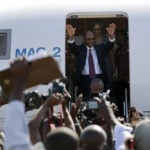 During the last four months, Haiti experienced violent political uprising, a shocking reemergence of an ex dictator, dubious recount of fraudulent votes and a historic debate between candidates Mirlande Manigat and Martelly ahead of their run off elections on March 20. However, none of these events generated as much excitement in Haiti as the second coming of twice elected and twice deposed, ex-President Jean-Bertrand Aristide ending his seven-year exile in South Africa.
During the last four months, Haiti experienced violent political uprising, a shocking reemergence of an ex dictator, dubious recount of fraudulent votes and a historic debate between candidates Mirlande Manigat and Martelly ahead of their run off elections on March 20. However, none of these events generated as much excitement in Haiti as the second coming of twice elected and twice deposed, ex-President Jean-Bertrand Aristide ending his seven-year exile in South Africa.
The former president landed in Haiti’s Toussaint Louverture Airport on Friday morning onboard a private jet and emerged to a greeting mob of journalists and supporters eager to catch a glimpse of him. “The problem is exclusion,” he proclaimed in his address to supporters. “And the solution is inclusion, inclusion for all Haitian people as human beings,” he continued.
Aristide became the first democratically elected president of Haiti in February 1991, but suffered a military coup seven months later. He reclaimed office in 1994 aided by President Clinton and his 20,000 U.S. marines. He overwhelmingly won the presidency again in 2001 with 92 percent of the vote, but large-scale insecurity, mismanagement, drug allegations and chaos resulted in political unrest and another coup in 2004. While the Bush administration called his ousting a voluntary departure, Aristide maintained that the Americans kidnapped him and his family, and forced them into exile.
His speech in the VIP lounge of the airport unloaded a mixture of poetry, languages, nostalgia, parabolas, sympathy, emotions and gratitude. “If you could put your ears close to my chest,” he said. “You would hear and feel my heart’s fastest rhythm singing a soothing melody of healing for Haiti our mother who need to inhale the air of dignity to outlive shame,” he told supporters. “If my heart was a house, I would know how many rooms all the victims would need so they could stop sleeping on the streets, in the mud and under tents,” he said. The crowd listening to his remarks outside the airport reacted jubilantly as it grew exponentially. One ecstatic supporter, Jean-Exeter Versailles, 33, told the Time: “He represents our father. I’m happy to welcome my father back home.”
Actor Danny Glover who shared the trip home with Aristide exclaimed, “It’s one of the most beautiful moments for the Haitian people,” speaking to the Associated Press (AP). “It is a historic moment for the Haitian people,” he added. Glover is a long time friend and strong supporter of ex-President Aristide. “I flew to Johannesburg to accompany my friend back home. We have a long history together. He is my friend and I am in support of his return to help the Haitian people rebuild, to be a part of all the wonderful things that he championed as president,” Glover told Agence France Press.
The Provisional Electoral Council barred Aristide’s party, Fanmi Lavalas, from participating in the recent elections on some technicalities, a sobering moment for the popular leader whose aides feared if he waited until the next inaugural address, he could be in exile forever. In spite of tremendous pressure from the U.S. to prevent or delay Aristide’s trip home, his persistence materialized. Thousands of cheering fans greeted him at the airport as security struggled to get him inside.
President Obama and the United Nations characterized Aristide’s return to Haiti two days before the scheduled second round of the elections as a destabilizing factor that could potentially derail an already delicate process. According to some polls, popular singer Michel “Sweet Micky Martelly, 50, enjoys a two-point lead over Manigat a 70-year-old academician and former first lady: Martelly 50.8 percent to Manigat 48.2 percent with a 1.27 percent margin of error. As they draw big crowds on the campaign trail, some of their rallies got increasingly violent prompting several organizations to denounce the acts.
For his part, Aristide not only denounced violence, but also insisted that he had no political ambitions and wanted to contribute to the rebuilding of the shattered country. Speaking to Democracy Now, a news organization who covered his homecoming trip, the former leader reaffirmed, “I share their happiness, I share their hope. I renew my commitment to help the in the field of education and when we move together toward such a goal, a difference will be made.” While both of the candidates strategically declared their support for the former leader to return home, little surfaced about their willingness to solicit his help or even keep him in the country once elected. Meanwhile, Aristide remains largely popular among an electorate hungry for strong leadership. His bodyguards and the police had to use tear gas to get him inside his home in Tabarre near the capital as thousands struggled to touch him. At least for now, his fans eager for directions will have to decipher his coded message. “We’re going to stay wherever he is until he tells us what to do,” said 44-year-old minibus driver Tony Forest to the AP, “We will vote for the candidate he picks.” However, many think tanks argued that Aristide, a deliberate metaphorical speaker, already delivered his message to his followers. Meanwhile, the anxious nation waits for the voting polls to open on Sunday to choose their next leader.
Related Articles